Our Class
The most produced modern Polish play outside of Poland proves to be a powerful, epic and disturbing play inspired by real events.
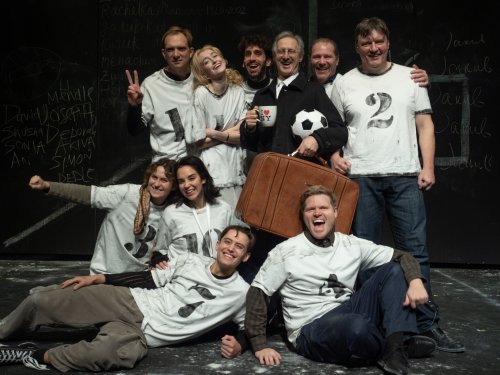
The cast of Tadeusz Slobodzianek’s “Our Class” at BAM Fisher (Photo credit: Pavel Antonov)
[avatar user=”Victor Gluck” size=”96″ align=”left”] Victor Gluck, Editor-in-Chief[/avatar]
Tadeusz Slobodzianek’s Our Class, the most produced modern Polish play outside of Poland, is a powerful and disturbing play inspired by real events. In 1941, the Polish citizens of the small town of Jedwabne killed 1,600 Jewish residents of the town in one night. Slobodzianek’s play creates a backstory as well as tells us what happened over eight decades to ten classmates, five Catholic Polish and five Jewish Poles who start out as friends in grade school. Although shocking, the twists and turns of its events following the lives of all these characters make for riveting theater. Given its world premiere at London’s Royal National Theatre in 2009, Igor Golyak’s current production at the Brooklyn Academy of Arts’ BAM Fisher Fishman Space is the first time the play has been seen in New York.
Adapted by Norman Allen, the play is structured in “XIV Lessons,” each dated on the giant blackboard that makes up the back wall of the stage from 1925 when the members of the class are five, six and seven up to 2003, the end of the life of the last living character. The blackboard also lists everyone’s birth and death dates so that we are aware from the beginning of their fates if we follow the list. It is also used for drawings, as a screen for historic documentary footage, and later in the post-war decades as a background for television interviews.
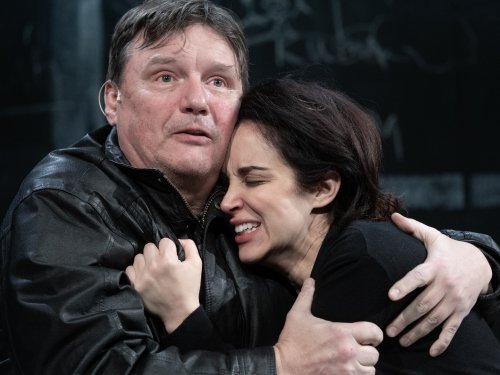
Ilia Volok and Alexandra Silber in a scene from Tadeusz Slobodzianek’s “Our Class” at BAM Fisher (Photo credit: Pavel Antonov)
The play begins when as children they are asked what they hope to become (cobbler, farmer, teacher, wagon driver, soldier, etc.), most wanting to follow in their fathers’ footsteps. Ironically, none of the ten ends up doing any of those things as World War II intervenes. They are all “friends” until 1937 when Heniek announces that “Dear Classmates, by the order of our esteemed Minister of Education it’s time to lift up in prayer the creed of our one true faith. Which means it is time for our Jewish friends to remove themselves to the back of the classroom.” This is the beginning of the virulent anti-Semitism that is unleashed leading to the ultimate atrocity four years later.
First to leave is Abram (Richard Topol) who in 1937 travels to America to become a rabbi. While we periodically hear from him by letter, he remains naïve about what is happening in Europe until many decades later, like many Americans. The murder of Józef Pilsudski, Chief of State and First Marshal of Poland, in 1935 becomes the turning point for unleashing first the underground and then mass violence. When the Soviets invade, Polish classmates Rysiek, Heniek, Wladek, and Zygmunt become a vigilante group calling themselves the “Four Musketeers” and commit atrocities that they blame on the Communists. When the Nazis arrive, they switch sides and continue preying on the Jews. Political classmate Jakub Katz becomes an announced Communist and he is the first one that is doomed. Dora who marries young is another early martyr. Rysiek, a psychopath, moves up in the hierarchy but comes to an early death at the hands of a fellow classmate.
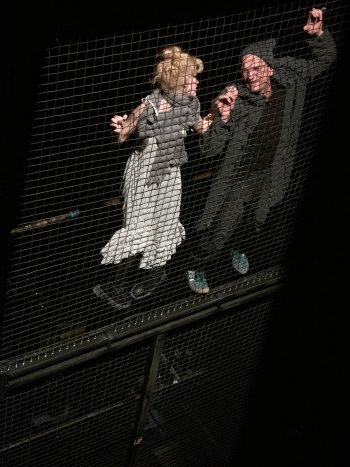
Gus Birney and Andrey Burkovskiy in a scene from Tadeusz Slobodzianek’s “Our Class” at BAM Fisher (Photo credit: Pavel Antonov)
Polish classmate Zocha married to a much older farmer hides Jewish Menachem and comes to pay a penalty for it later. Polish peasant farmer Wladek hides Rachelka , the only Jewish woman left alive in the town, and marries her when she converts to Catholicism as she sees it as her only choice to survive. Heniek becomes a Catholic priest but is guilty of a great many sins not worthy of a clergyman. Zygmunt, an opportunist and sociopath, learns to cover his tracks as he eventually comes to portray a good citizen which he has not been. After the war, Menachem joins the Polish secret police in order to get his revenge and turns into a hated monster. When the holocaust that took place is finally investigated years later, the probe takes a series of ironic turns as one each tries to save himself. Several of the characters are eventually wracked with guilt in their later years.
The direction by Igor Golyak, producing artistic director of the Boston-based Arlekin Players Theatre which staged the play, is spot on with his characters, while his expressionistic production is full of ideas, not all of which work, beginning with each act starting as a reading with all of the actors working from scripts, a gimmick which is quickly dropped. Besides the giant blackboard, Jan Pappelbaum’s minimalist set makes use of chairs, a table, two ladders, and doors that open in the middle of the blackboard used to a reveal a room and a loft space used for various sequences. Sasha Ageeva’s costumes tend toward the contemporary while Adam Silverman’s lighting approaches the mystical. Eric Dunlap’s projection design is often powerful, often distracting as it backs other scenes.
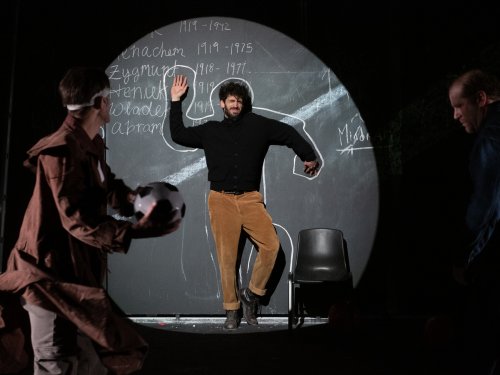
José Espinosa, Stephen Ochsner and Elan Zafir in a scene from Tadeusz Slobodzianek’s “Our Class” at BAM Fisher (Photo credit: Pavel Antonov)
The play is challenging for the audience as all ten characters narrate at one time or another. While only Richard Topol as Abram and Alexandra Silber as Rachelka later baptized as Marianna are recognizable faces, it is a great many unfamiliar people to keep straight. Not only are some of the Polish names difficult to keep straight as they sound similar, several of the European born actors have thick accents in English which makes them hard to understand. Nevertheless, this is engrossing and ambitious epical theater covering eight decades and most of the history of the twentieth century.
While all the actors are fine in their roles, not all the members of the cast make the same impression as several are off stage for long periods of time and others have more showy roles. José Espinosa is frightening as the psychopathic Rysiek who comes to a bad end in 1942. Before our eyes Andrey Burkovskiy as the mild cinephile Menachem changes into a psychopath himself to get his revenge for the death of his wife and child. Elan Zafir as Zygmunt is the most devious of all switching sides and lying when it suits his purpose. Stephen Ochsner as the political and determined Jakub Katz who disappears early in the story is a forceful figure until he is eliminated by his own classmates.
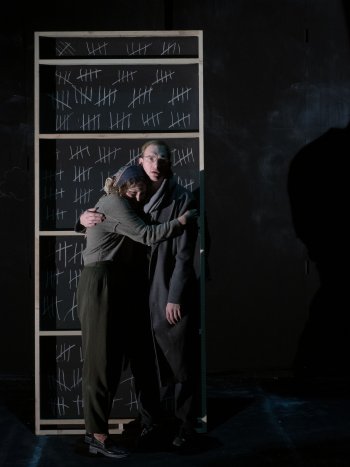
Tess Goldwyn and Andrey Burkovskiy in a scene from Tadeusz Slobodzianek’s “Our Class” at BAM Fisher (Photo credit: Pavel Antonov)
Gus Birney, who was seen in BAM’s revival of The Sign in Sidney Brustein’s Window last year and daughter of actor Reed Birney, is a sweet, doomed Dora. As Heniek who eventually becomes the town’s priest, Will Manning is a devious, tricky character always having an excuse for his wrongdoing. Tess Goldwyn, daughter of actor Tony Goldwyn and great-granddaughter of Pulitzer Prize-winning playwright Sidney Howard and film producer Samuel Goldwyn, makes a strong impression as the indomitable Zocha who eventually has to leave the country due to her aid to the Jews during the war. As the weak but enduring Wladek, Ilia Volok makes an uneducated person into a memorable character.
Tadeusz Slobodzianek’s Our Class is epic in its storytelling and shocking in its specifics. At three hours, the play is never long or boring as every line of dialogue offers new details to be digested as ten lives are laid out for us. While rather busy, Igor Golyak’s production is always illuminating, always compelling. The cast of ten mostly young actors, many unfamiliar to New York audiences, are always riveting as they tell their individual and intertwining stories. What may be most shocking is that in Jan Gross’ prose account in his 2001 book Neighbors: The Destruction of the Jewish Community in Jedwadne, Poland he reveals that this was not the only Polish town in which these atrocities against the Jews took place. One realizes why the world premiere of Our Class took place in Great Britain and not Poland.
Our Class (extended through February 11, 2024)
Arlekin Players Theatre
Under the Radar Festival 2024
Brooklyn Academy of Music
BAM Fisher Fishman Space, 321 Ashland Avenue, in Brooklyn
For tickets, visit http://www.ourclassplay.com
Running time: three hours including one intermission






Leave a comment